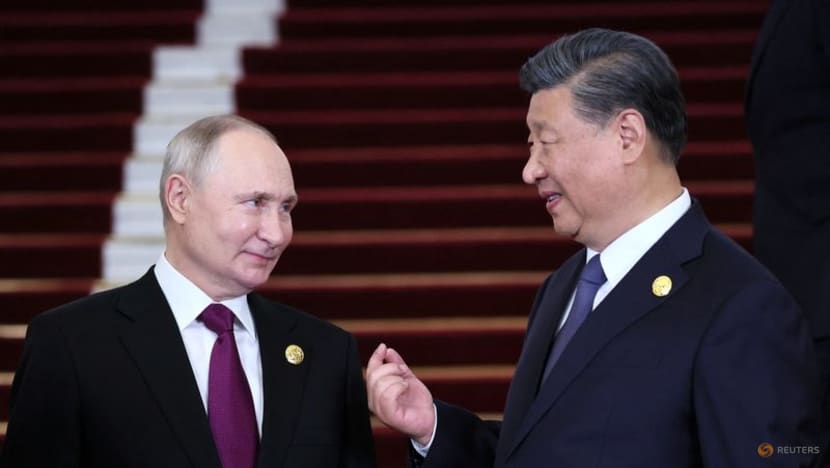Commentary: China can’t stop Russia. It likely won’t even try
The war in Ukraine has been ongoing for well over two years. If Chinese President Xi Jinping believed that it seriously threatened China’s security or welfare, he would already have reacted, says political scientist Dylan Motin.

Russian President Vladimir Putin is welcomed by Chinese President Xi Jinping during a ceremony at the Belt and Road Forum in Beijing, China on Oct 17, 2023. (File photo: Reuters/Sputnik/Sergei Savostyanov/Pool)

This audio is generated by an AI tool.
SEOUL: “Russia is so dependent on China right now that one phone call from President Xi Jinping would solve this crisis,” stated Finnish President Alexander Stubb when discussing the Ukraine war last week.
"If he (Xi) were to say ‘time to start negotiating peace’, Russia would be forced to do that," Stubb said in an interview with Bloomberg. "They would have no other choice."
The statement assumes two things here. First, China can push Russia to abandon its invasion of Ukraine. Second, it may want to do so. Both assumptions are wrong.
PUTIN AND XI’S BROMANCE
China and Russia have touted a “no-limits” relationship since February 2022, days before Russia invaded Ukraine. Indeed, the leaders of both countries most recently hailed their partnership as “experiencing their best period in history”, at the Shanghai Cooperation Organization summit in Kazakhstan.
China has been Russia’s largest trading partner for 13 years, with Chinese goods accounting for more than 30 per cent of Russia’s imports. More to the point, the Russian military-industrial complex imports large amounts of components from China. Dual-use Chinese equipment like drones and light vehicles are employed by Russian troops fighting in Ukraine. Hence, Beijing has some leverage over Russia’s war machine.
Still, Moscow’s dependency on Chinese support should not be overstated. Russia is a great power and one of the leading world economies, while Ukraine is a smaller nation short on money. A decrease in trade with China would undoubtedly harm Russia’s economic prospects, but it would do little to correct the power imbalance between Russia and Ukraine.
More hurtful would be an embargo on dual-use materials and equipment. But here, too, it may not suffice to stop Russia.
The massive Russian defence industry succeeded the Soviet Union’s, which did not rely on outside partners. Russia is a country of almost 150 million people with a vast industrial base and near-limitless natural resources. It can become self-sufficient if required. For instance, Russia’s domestic shell production already exceeds that of the entire collective West.
Moscow imports Chinese goods en masse because they are cheap and allow its workers to focus on higher-end labour, thus speeding production and limiting costs. But if China were to stop all dual-use exports toward Russia (notably vehicle parts), the Russian industry could replace most of them with domestic production over time. It would be costly and painful for sure, but not enough to break its military apparatus.
In any case, China is not Russia’s only enabler. The Kremlin can count on North Korea, Iran and even goods discreetly imported through third parties from the West.
CHINA’S VESTED INTEREST IN RUSSIA
Still, debating potential Chinese pressure on Russia is moot since China has no interest in weakening Russia. The war in Ukraine has been ongoing for well over two years.
If Mr Xi believed that the Russian invasion seriously threatened China’s security or welfare, he would already have reacted. There is no reason to expect a sudden change of heart in Beijing this late in the conflict.
To be clear, China has maintained that it is a neutral party in the Ukraine conflict and is committed to promoting talks for peace. Ukrainian President Volodymyr Zelenskyy said last month that Mr Xi, in a phone call between the two men, said that he would not sell weapons to Russia.
But Beijing has a vested stake in Moscow winning its war against Ukraine.
First, Russia is the only world power that enjoys close relations with China. A defeated and weakened Russia would leave Beijing alone in its competition with the United States and its formidable alliance network.
Conversely, a powerful Russia would help counterbalance Washington. If Mr Xi, too, decided to use force to solve the Taiwanese issue or other border conflicts, he would be happy to receive support from a strong Vladimir Putin.
Second, a formidable Russia represents a valuable diversion. It forces Washington to pay attention to European affairs and invest money and resources to support Ukraine. The more threatening Russia is, the less bandwidth the US has to contain China in the Indo-Pacific region. Moreover, the Kremlin could engineer trouble in Europe during a Taiwanese contingency, thus dividing American attention still more
If decisively defeated in Ukraine, the Kremlin would have to prioritise domestic consolidation and lack the means to threaten the North Atlantic Treaty Organization (NATO) seriously. Such a scenario would enable the US to focus all its energy against China, seriously complicating its regional ambitions.
Beijing’s calculus seems to be paying off. Since the failure of the Ukraine’s summer counteroffensive in 2023, the Russian military has recovered from its nadir and now has the upper hand. Short of an unpredictable and dramatic inversion of the balance of forces, it appears well-positioned to defeat Ukraine.
Now battle-hardened and larger than pre-2022, Russia’s armies will pose an enduring threat to NATO’s eastern flank. It forces painful tradeoffs on American planners, whose forces are already overstretched between defending East Asia, Eastern Europe and the Middle East.
The US should not fall into the trap of prioritising Europe over Asia. Russia is undoubtedly a redoubtable threat, but China is the pacing challenge.
Dylan Motin holds a PhD in political science. He is currently non-resident Kelly Fellow at the research institute Pacific Forum and the author of Bandwagoning in International Relations: China, Russia, and Their Neighbors.

















